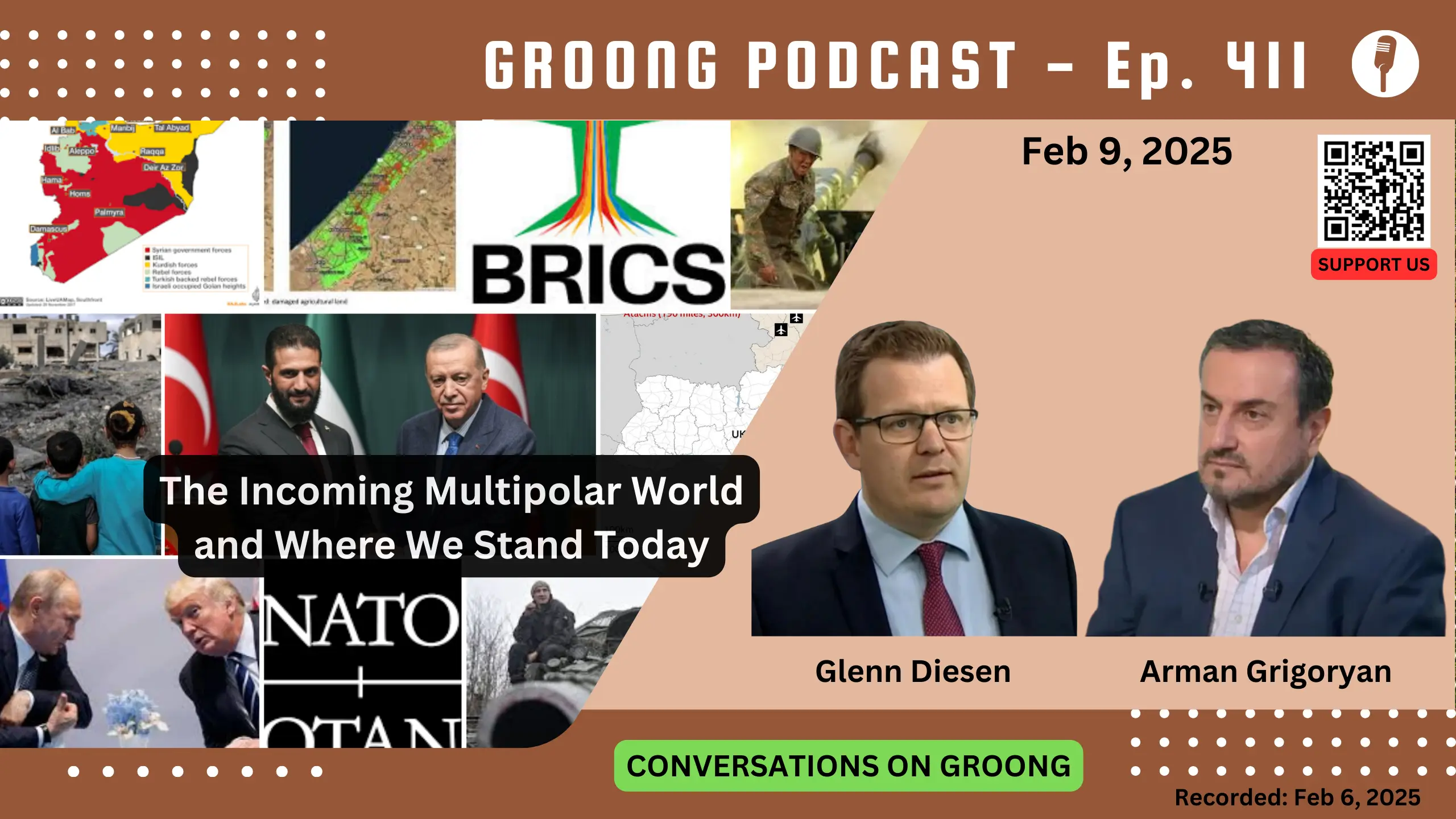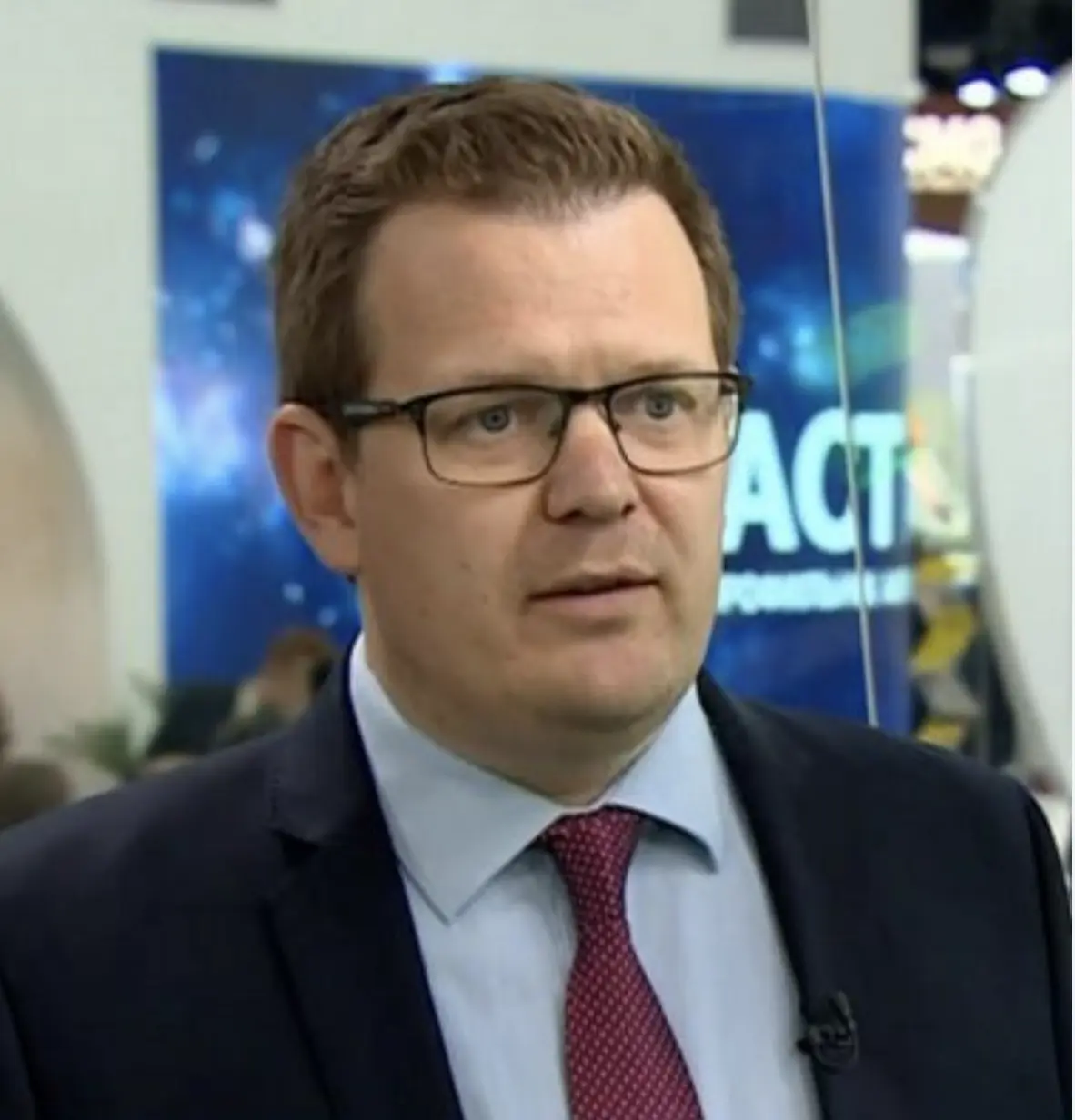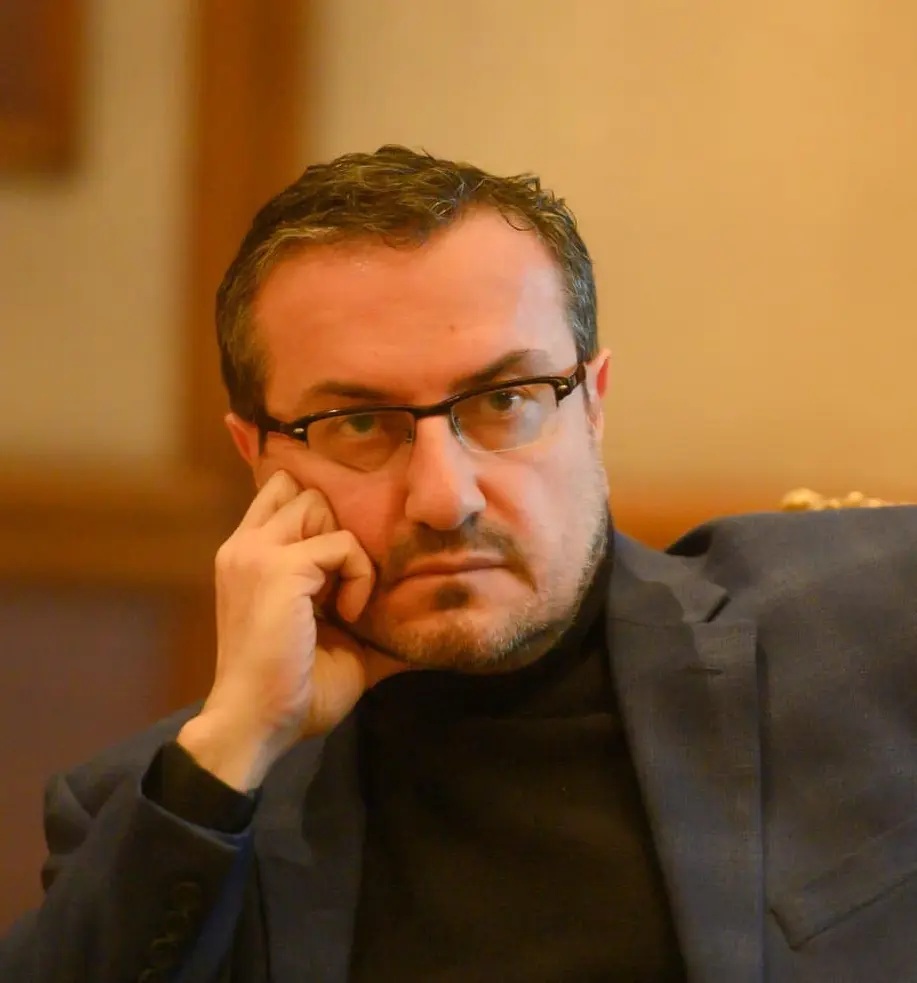
Groong Links:
Guest:
Topics:
- The Ongoing conflicts: Gaza, Syria, Ukraine
- Shifting Global Power and Alliances
- Small Countries in a Multipolar World
Episode 411 | Recorded: February 6, 2025
Show Notes
The Incoming Multipolar World and Where We Stand Today
The Ongoing conflicts: Gaza, Syria, Ukraine
Gaza: Trump’s Shocking Statements on Ethnic Cleansing
- Trump’s proposal to “take over” and redevelop Gaza as the “Riviera of the Middle East”
- The UN condemns the plan as illegal and warns of ethnic cleansing
- Regional implications: Would Jordan, Egypt, Saudi Arabia, and others accept it?
- Does this align with Trump’s “America First” strategy?
Syria: Turkey’s Strategic Moves
- Former wanted terrorist Ahmed al-Sharaa (Abu Mohammad al-Julani) now rules Syria
- Turkey signs military alliance with Syria and establishes military bases
- Has Turkey successfully consolidated its control, or is it overextending?
- Potential consequences for Turkey’s broader regional ambitions, including the South Caucasus
Ukraine: The War’s Endgame and Global Repercussions
- Trump’s promise to end the war quickly—how realistic is it?
- Mixed signals: threats of new sanctions on Russia vs. demand that Ukraine provide rare earth resources as collateral
- UK’s unprecedented 100-year strategic deal with Ukraine, including military cooperation
- Why is this war seen as the defining moment for a transition to a new world order?
Shifting Global Power and Alliances
The West’s Declining Influence & The Rise of Multipolarity
- Marco Rubio’s statement: “It’s not normal for the world to simply have a unipolar power.”
- The shift away from the US acting as the world’s sole “police officer”
- The significance of Ukraine as the catalyst for a new global order
China and Russia: A Strengthening Strategic Relationship
- NATO’s post-Cold War expansion—did it push Russia toward China?
- Could the US have prevented this alliance by integrating Russia earlier?
- What does the China-Russia alliance mean for the future of global power?
Multipolarity and Emerging Alliances
- NATO as a military bloc vs. BRICS as an economic federation—two different models
- How BRICS is reshaping global financial systems and reducing reliance on the dollar
- Could NATO members (like Turkey) also become BRICS members, and what does that mean geopolitically?
The Future of NATO in a Multipolar World
- If military power is no longer the primary determinant of global influence, how must NATO evolve?
- As the US reduces its international military commitments, will European states step up?
- Are NATO’s member states truly aligned, or are internal fractures emerging?
- How will shifting alliances affect NATO’s relevance in the coming decades?
Small Countries in a Multipolar World
The Role of Middle Powers & Small States
- In a world divided between competing economic and military blocs, where do middle powers (Turkey, Iran, Indonesia, Brazil, etc.) fit?
- What role do smaller nations like Armenia, Georgia, Azerbaijan, and Lebanon play?
Survival Strategies for Small Countries in a Shifting Global Order
- Can small states maintain strategic neutrality in a world where major powers are reconfiguring alliances?
- The importance of balancing relationships with the West, Russia, and China
- The risks of being drawn into great power conflicts
Neutrality as a Strategy?
- Dr. Pascal Lottaz’s perspective: Is neutrality the best path for smaller nations?
- Can a country like Armenia realistically remain neutral, or is it inevitably forced to align with one side?
- Historical examples of successful neutral states—can Armenia follow a similar model?
Key Questions Discussed
Shifting Global Power and Alliances
China & Russia: A New Axis or Marriage of Convenience?
- Has NATO’s post-Cold War expansion pushed Russia and China closer together?
- If the US had integrated Russia into Western institutions earlier, would today’s multipolarity look different?
- How solid is the China-Russia relationship, and could it evolve into its own geopolitical “pole”?
The Rise of BRICS and the Future of Global Alliances
- How does BRICS challenge Western financial dominance?
- Could BRICS replace the US-led global economic system?
- Turkey’s ambiguous position: Can a NATO member also join BRICS?
The Future of NATO in a Multipolar World
- As BRICS expands, can NATO maintain its role as a dominant military alliance?
- Could regional powers realign, shifting the global balance?
Small Countries in a Multipolar World
- Survival Strategies for Smaller Nations
- How can small countries like Armenia avoid being caught between major geopolitical forces?
- Will they face increasing pressure to pick sides, and what would the new global divisions look like?
- Can true neutrality be an option, or is alignment inevitable?
Links Referenced During the Show
- Al Jazeera: Trump Says the US Will “Take Over” Gaza
- Al Jazeera: UN Officials Denounce Trump’s Gaza Plan as Unlawful
- The Jerusalem Post: International Reactions to Gaza Proposals
- Marco Rubio on the End of Unipolarity
- Glenn Diesen’s Tweet on Human Rights NGOs & War Propaganda
- Glenn Diesen’s Tweet on USAID and Foreign Influence
- Arman Grigoryan’s Paper: Selective Wilsonianism – Material Interests & Democracy
Wrap-up
Don’t forget to support us:
That’s our show! We hope you found it useful. Please find us on Social Media and follow us everywhere you get your Armenian news.
Thanks to Laura Osborn for the music on our podcasts.
Guests

Glenn Diesen
Dr. Glenn Diesen a professor at the University of South-Eastern Norway, and associate editor at Russia in Global Affairs, and editor of Political economy, Russian foreign policy and Eurasian integration.
Glenn Diesen has authored several influential books that explore the geopolitical shifts in the modern world, with a particular focus on Russia’s role in the emerging global order. His works include “The Think Tank Racket: Managing the Information War with Russia”, which critiques Western think tanks and their influence on public perception and policy. “In Europe as the Western Peninsula of Greater Eurasia”, he examines the strategic implications of Eurasian integration and Europe’s changing role in the global power structure. “Russian Conservatism: Managing Change under Permanent Revolution” delves into the ideological foundations of Russian conservatism and its impact on domestic and foreign policy. Diesen’s books collectively provide a nuanced understanding of the interplay between economics, ideology, and geopolitics, offering fresh perspectives on the reconfiguration of global power and the West’s engagement with Russia

Arman Grigoryan
Dr. Arman Grigoryan is an associate professor of International Relations at Lehigh University. He has a doctorate in political science from Columbia University in New York, and a Master in IR from the University of Chicago. His research has appeared in International Security, Security Studies, International Studies Quarterly, International Political Science Review, Nationalities Papers, Ethnopolitics, and International Analytics.
Hosts

Hovik Manucharyan
Hovik Manucharyan is an information security engineer who moved from Seattle to Armenia in 2022. He co-founded the ANN/Groong podcast in 2020 and has been a contributor to Groong News since the late 1990s.
Disclaimer: The views expressed by Hovik Manucharyan on the ANN/Groong podcast are his own and do not necessarily reflect the opinions of his employer or any other organization.

Asbed Bedrossian
Asbed Bedrossian is an IT professional, and for years oversaw the central IT enterprise infrastructure and services at USC. His decades of experience spanned across IT strategy, enterprise architecture, infrastructure, cybersecurity, enterprise applications, data center operations, high performance computing, ITSM, ITPM, and more.
Asbed founded the Armenian News Network Groong circa 1989/1990, and co-founded the ANN/Groong podcast in 2020.